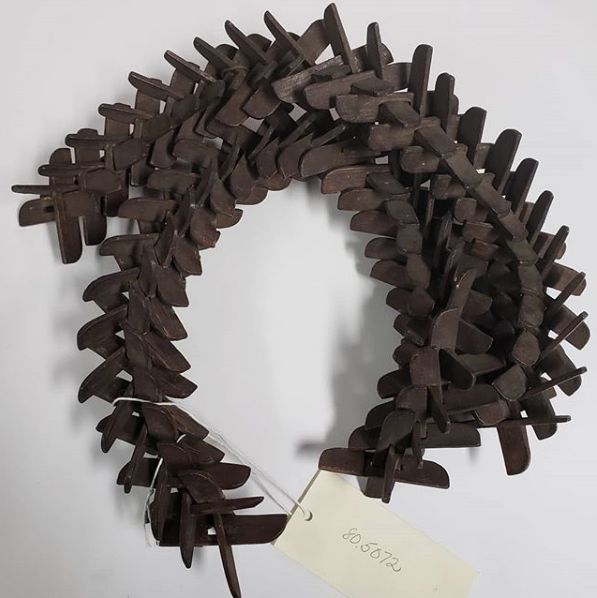Lincoln Letters for Kids: What Did Soldiers Do All Day?
Published 3:00 pm Wednesday, May 6, 2020

- Photo Courtesy of the Abraham Lincoln Library and Museum Pictured is a long, wooden chain that a soldier carved from a single piece of wood. This piece of history can be viewed at an exhibit displayed at the Abraham Lincoln Library and Museum.
Natalie Sweet, Program Coordinator Abraham Lincoln Library and Museum
Have you ever watched a movie about the American Civil War? It can seem like soldiers marched, drilled, and fought all day long. The reality was actually a little bit different. Certainly, soldiers crossed many miles, and they complained about holding their guns at attention for long hours in their letters home, but there could be weeks or even months between battles. So what did soldiers do when they were not drilling or fighting?
One thing that occupied many hours of a soldier’s day was looking for something to eat. Last week, you learned about how soldiers did not always have the best or freshest food issued to them. Because of this, they often foraged, or searched the land, for berries, nuts, herbs, onions, apples, and other good things to eat. One Union soldier who was stationed at the Cumberland Gap during the Civil War wrote home to his brother in 1862 about his foraging in Claiborne County. The soldier, Harvey Durkee, grew bored with the lack of action in the area, and so he and a few other soldiers foraged at a nearby orchard and picked lots of fruit from a farmer’s trees. He wrote, “I have got nothing to do but lay in the tent and eat peaches and apples and tell storeys [sic] and fart and so forth and so on anny [sic] way to pass along the time…” Bad manners aside, Harvey Durkee perhaps should have used the extra time to work on his spelling!
You have likely been working on your own spelling while you are learning at home this school year. Here is another way that you can combine learning and having fun, too: forage in a foot! You will need to find a long piece of string. Take the string outside, and then cast a circle with the string. Get close to the ground. What can you find? At first, you may think that you only see regular old grass. But look closer. Record what you find in a notebook. What type of flora, or plants, can you find in your circle? You might find grass, clover, dandelions, or even wild onions and garlic. Or you might find a type of purple flower that belongs to the mint family: purple dead nettle. Soldiers would sometimes use the plants they found to eat or to make medicines – but they had to be certain that what they found was edible! Today, we are lucky that apps for phones, like PlantNet, can help us quickly identify plants in our backyards. You might even draw what you find in your yard – soldiers did that, too, when they came across new plants. Label the parts of the plants you find. What do the roots look like? The leaves? The stems?
Other soldiers preferred to stay in their tents and put their hands to work to pass the time. You may have done that, too, during quarantine. At the Abraham Lincoln Library and Museum, one exhibit contains a long, wooden chain that a soldier carved from a single piece of wood – he was very bored, and it was a good way to pass many weeks! While carving a long piece of wood may not sound fun to you, he enjoyed it because he liked to carve wood. You may like to draw, color, sew, or use modeling clay or Play Dough. The most important thing to remember when we feel bored is that there is always something that we can do to help pass the time. We just have to remember how we might use our hands to make something useful or beautiful. Or, we might do an activity like the forage in a foot, and learn to look at our nearby world in new ways. Right now, just like those Civil War soldiers 155 years ago, the most important thing we can do is remain stationed where we are. It is up to us to find ways to “pass along the time” as Harvey Durkee said!





